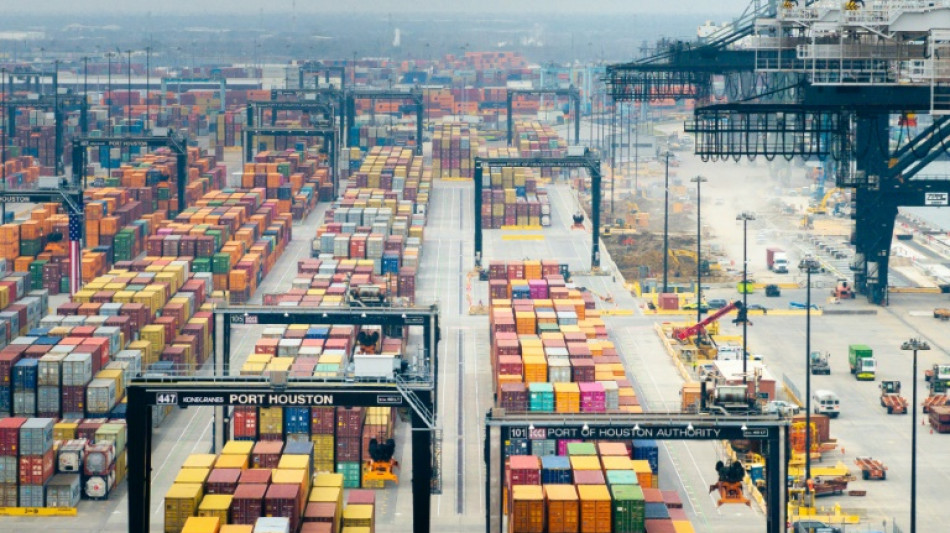
-
 Nasdaq rallies again while yen falls despite BOJ rate hike
Nasdaq rallies again while yen falls despite BOJ rate hike
-
Bologna win shoot-out with Inter to reach Italian Super Cup final

-
 Brandt and Beier send Dortmund second in Bundesliga
Brandt and Beier send Dortmund second in Bundesliga
-
Trump administration begins release of Epstein files

-
 UN Security Council votes to extend DR Congo mission by one year
UN Security Council votes to extend DR Congo mission by one year
-
Family of Angels pitcher, club settle case over 2019 death

-
 US university killer's mystery motive sought after suicide
US university killer's mystery motive sought after suicide
-
Rubio says won't force deal on Ukraine as Europeans join Miami talks

-
 Burkinabe teen behind viral French 'coup' video has no regrets
Burkinabe teen behind viral French 'coup' video has no regrets
-
Brazil court rejects new Bolsonaro appeal against coup conviction

-
 Three-time Grand Slam winner Wawrinka to retire in 2026
Three-time Grand Slam winner Wawrinka to retire in 2026
-
Man Utd can fight for Premier League title in next few years: Amorim

-
 Pandya blitz powers India to T20 series win over South Africa
Pandya blitz powers India to T20 series win over South Africa
-
Misinformation complicated Brown University shooting probe: police

-
 IMF approves $206 mn aid to Sri Lanka after Cyclone Ditwah
IMF approves $206 mn aid to Sri Lanka after Cyclone Ditwah
-
US halts green card lottery after MIT professor, Brown University killings

-
 Stocks advance as markets cheer weak inflation
Stocks advance as markets cheer weak inflation
-
Emery says rising expectations driving red-hot Villa

-
 Three killed in Taipei metro attacks, suspect dead
Three killed in Taipei metro attacks, suspect dead
-
Seven Colombian soldiers killed in guerrilla attack: army

-
 Amorim takes aim at Man Utd youth stars over 'entitlement'
Amorim takes aim at Man Utd youth stars over 'entitlement'
-
Mercosur meets in Brazil, EU eyes January 12 trade deal

-
 US Fed official says no urgency to cut rates, flags distorted data
US Fed official says no urgency to cut rates, flags distorted data
-
Rome to charge visitors for access to Trevi Fountain

-
 Spurs 'not a quick fix' for under-fire Frank
Spurs 'not a quick fix' for under-fire Frank
-
Poland president accuses Ukraine of not appreciating war support

-
 Stocks advance with focus on central banks, tech
Stocks advance with focus on central banks, tech
-
Amorim unfazed by 'Free Mainoo' T-shirt ahead of Villa clash

-
 PSG penalty hero Safonov ended Intercontinental win with broken hand
PSG penalty hero Safonov ended Intercontinental win with broken hand
-
French court rejects Shein suspension

-
 'It's so much fun,' says Vonn as she milks her comeback
'It's so much fun,' says Vonn as she milks her comeback
-
Moscow intent on pressing on in Ukraine: Putin

-
 UN declares famine over in Gaza, says 'situation remains critical'
UN declares famine over in Gaza, says 'situation remains critical'
-
Guardiola 'excited' by Man City future, not pondering exit

-
 Zabystran upsets Odermatt to claim first World Cup win in Val Gardena super-G
Zabystran upsets Odermatt to claim first World Cup win in Val Gardena super-G
-
Czechs name veteran coach Koubek for World Cup play-offs

-
 PSG penalty hero Safonov out until next year with broken hand
PSG penalty hero Safonov out until next year with broken hand
-
Putin says ball in court of Russia's opponents in Ukraine talks

-
 Czech Zabystran upsets Odermatt to claim Val Gardena super-G
Czech Zabystran upsets Odermatt to claim Val Gardena super-G
-
NGOs fear 'catastrophic impact' of new Israel registration rules

-
 US suspends green card lottery after MIT professor, Brown University killings
US suspends green card lottery after MIT professor, Brown University killings
-
Stocks mixed with focus on central banks, tech

-
 Arsenal in the 'right place' as Arteta marks six years at club
Arsenal in the 'right place' as Arteta marks six years at club
-
Sudan's El-Fasher under the RSF, destroyed and 'full of bodies'

-
 From farms to court, climate-hit communities take on big polluters
From farms to court, climate-hit communities take on big polluters
-
Liverpool have 'moved on' from Salah furore, says upbeat Slot

-
 Norway crown princess likely to undergo lung transplant
Norway crown princess likely to undergo lung transplant
-
Iraq negotiates new coalition under US pressure

-
 France's budget hits snag in setback for embattled PM
France's budget hits snag in setback for embattled PM
-
Putin hails Ukraine gains, threatens more, in annual press conference


US trade deficits at core of Trump tariff moves
Imposing punitive tariffs on countries with high trade surpluses with the United States has been at the heart of US President Donald Trump's economic policy.
Trump has lived up to his campaign pledges to resume his hardball trade diplomacy.
But analysts say trade imbalances can sometimes be the result of US policy itself.
- What is a trade deficit? -
A trade deficit occurs when a country's imports exceed its exports to another country. The balance is usually calculated on trade of goods such as cars, electronics, farm products or oil and gas, among other things.
International comparisons usually focus on goods but some analysts say trade in services -- such as financial systems, transports, tourism or communications services -- should also be taken into account to get the full picture.
The United States, for instance, has a large trade deficit with many of its partners when just considering goods, but once services are taken into account the overall imbalance is less.
"Politicians are obsessed with the material nature of physical goods," said Niclas Poitiers, a research fellow at Brussels' think tank Bruegel.
Poitiers noted that countries can't impose tariffs on services, hence Trump's insistence on focusing on goods.
- Who is Trump targeting? -
"We have deficits with almost every country -- not every country, but almost -- and we're going to change it," Trump vowed at the beginning of February, while announcing he would imposed fresh tariffs on Canada, Mexico and China.
The United States posted a goods trade deficit of $295 billion with China in 2024, $63 billion with Canada and $172 billion with Mexico, according to the US Department of Commerce.
While the tariffs on China were implemented, Trump agreed to delay those against Mexico and Canada.
With the European Union, the deficit reached $157 billion in 2023, according to the Eurostat data agency, driven by trade surpluses in Germany, Italy and Ireland.
Japan, South Korea and India are also among the 10 countries with the largest surpluses.
- Is the data reliable? -
The numbers should be dealt with carefully as calculations can vary from one country to the next depending on local accounting norms, the exchange rate used, or to what extent transportation costs are included.
Such inconsistencies mean that some countries can go from having a surplus to having a deficit. France, for instance, had a goods surplus of $14 billion in 2023, according to US statistics, but a deficit of $7 billion according to French customs.
There are differences within the European Union, too, where national figures can differ from those of the European Commission.
This is due the fact that US goods cleared through customs in the Netherlands, Germany or Belgium before being shipped to France, are registered by Eurostat as coming from these countries, French customs have said.
- Where do deficits come from? -
Trump has said that US partners have been taking advantage of the situation, but analysts argue that the reality is more complex with a number of factors playing a part.
"The dollar is at the top of the pile," said Elvire Fabry, a senior researcher in trade geopolitics at the Jacques Delors Institute, in Brussels.
The dollar's status as the world's preeminent reserve currency tends to push its value higher, but this makes American exports more expensive and less competitive for foreign buyers.
Low US savings rates -- at around five percent since the beginning of the 2000s, according to the Federal Reserve Bank of St. Louis -- encourages consumption, including imported goods.
Other factors are at play, such as China maintaining its currency at a low level, making its exports more competitive.
The type of goods manufactured in the United States also matters, said Fabry.
"If the United States can't export more American car brands, it's because they don't suit European consumption," where smaller cars prevail, Fabry said.
More broadly, there are questions on whether economic policy should be based on trade statistics alone.
"Bilateral trade deficits are not really meaningful," said Poitiers, taking the example of the way iPhones are manufactured.
"There are (iPhone) components that are manufactured in South Korea, these components are shipped from South Korea to China, where the stuff is assembled," Poitiers said.
They are then exported from China to the United States, showing up in both countries' bilateral trade, when Apple is an American company, he said.
D.Schneider--BTB
